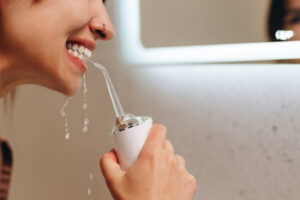Achieving optimal oral hygiene is integral to the long-term health of your mouth, and water flossers are becoming increasingly popular as an effective tool to help maintain good oral health. Water flossers use pressurised streams of water that remove plaque and food particles from between the teeth and gums, which can be difficult to reach with traditional string floss.
While there has been some debate about their effectiveness compared to other methods, research suggests that they may offer several benefits over traditional brushing and flossing techniques. In this blog post, we’ll explore the advantages of using a water flosser and discuss how it could benefit your overall dental health.
What are water flossers, and how do they work?
For those looking to switch up their dental hygiene routine, water flossers provide a great alternative to traditional string flossing. They work by utilising a stream of pulsating water that is directed through a nozzle at the teeth and gums, where it helps to remove plaque and food particles from those hard-to-reach places.
 This gentle jet of water loosens the debris between teeth and along the gum line, helping to reduce bacteria buildup and promote oral hygiene. The pulsing pressure also stimulates gums, promoting improved circulation for stronger gums over time. Many models come with a variety of tips that can be used for different areas in the mouth, providing a customised approach for optimal dental care.
This gentle jet of water loosens the debris between teeth and along the gum line, helping to reduce bacteria buildup and promote oral hygiene. The pulsing pressure also stimulates gums, promoting improved circulation for stronger gums over time. Many models come with a variety of tips that can be used for different areas in the mouth, providing a customised approach for optimal dental care.
Generally, water flossers are easier to use than standard dental floss and may take less time as well; however, they are more expensive than traditional options and require regular replacement parts or batteries in order to maintain their effectiveness.
The benefits of using a water flosser
Water flossers offer numerous advantages when compared to traditional flossing:
- For starters, water flossers are much gentler on the gums and teeth since they do not require any manual movement or pulling. Instead, powerful jets of water are used to remove particles between teeth and gum pockets.
- Water flossers can also help maintain better oral hygiene by targeting hard-to-reach areas that would otherwise be difficult to clean – this makes them an incredibly useful tool in reducing the risk of developing gum disease and cavities, as well as in helping with bad breath.
- Water flossing is one of the most efficient methods of removing plaque – users should expect a much more dazzling smile after just a few weeks of use!
All things considered, it is clearly evident that there are various advantages to using a water flosser – from better oral hygiene to improved dental health – making them an obvious choice for anyone looking for an effective yet gentle way to keep their mouth clean.
How to use a water flosser effectively
Utilising a water flosser is an effective and time-efficient way to improve oral hygiene. When using the device:
- Start by filling the reservoir with lukewarm tap water and ensuring the tip of the nozzle is resting snugly between your teeth for maximum cleaning effectiveness.
- Next, set the pressure control to a comfortable setting that you can handle without overheating or irritating your gums.
- Aim the stream in a back-and-forth manner across spaces between the teeth for 30 seconds, paying special attention to areas that may have been missed during regular brushing.
- Afterwards, start from another area and work towards forming a circular pattern until you’ve covered all your teeth surfaces around two to three times.
- Don’t forget to tilt the nozzle at a 45-degree angle while pointing it at the gum line and into crevices between teeth when flossing; this ensures adequate coverage of all dental surfaces.
- Finally, rinse with clean water and enjoy improved dental health!
Are there any downsides to using a water flosser?
While water flossers, also known as oral irrigators, have become increasingly popular for oral care due to their effectiveness in cleaning between and around teeth, some people still debate the potential drawbacks of using this device.
Water flossers are often louder and more expensive than traditional dental floss, making them less convenient and accessible for many people.
Additionally, if not used properly, they can be too forceful and damage gums or otherwise cause painful irritation inside the mouth. These downsides should always be taken into consideration when deciding whether a water flosser is right for you.
Which type of water flosser is right for me?
 There are many types of water flossers on the market, and making the right decision for your individual needs can be a difficult choice.
There are many types of water flossers on the market, and making the right decision for your individual needs can be a difficult choice.
- If you’re looking for portability, consider a battery-operated water flosser that is lightweight and easy to tote around.
- If you have sensitive gums, opt for an oral irrigator that has multiple pressure settings so you can choose the one most comfortable for you.
- For those with special oral health considerations, there are also water flossers designed to provide deeper cleaning than traditional models.
Before deciding which one is right for you, do some research and talk to your dentist to ensure that you make the best decision based on your particular situation.
Conclusion
Ultimately, deciding whether or not to use a water flosser to floss teeth is a personal choice. However, if you are looking for an easy and effective way to improve your oral hygiene routine, a water flosser may be a good option for you. Be sure to do your research to find the right type of water flosser for your needs, and follow the instructions carefully to ensure that you are using it properly.
You should also keep in mind that there are some downsides to using a water flosser, such as the potential for allergies and gum sensitivity. Have you ever used a water flosser? What was your experience like? Let us know in the comments below!
If you’re looking for an effective way to improve your oral hygiene routine, Beyond Infinity Dental is offering you Denfinity, a high-quality, advanced water flosser coupled with a stylish electric toothbrush that is designed to help you achieve optimal dental health and hygiene in a fraction of the time it takes with traditional brushing and flossing methods.
With its powerful jets of pulsating water, our water flosser can remove plaque and food particles from between teeth and gums that would otherwise be difficult to reach. Additionally, the gentle pressure helps stimulate circulation in the gums while also providing a customised approach for maximum cleaning effectiveness. Take control of your oral health today with our state-of-the-art water flosser! Buy yours now!
Sources
Water flossers and water flossing
https://www.mouthhealthy.org/all-topics-a-z/water-flossers
Is it more effective to floss teeth with a water flosser or with standard dental floss?
https://www.mayoclinic.org/healthy-lifestyle/adult-health/expert-answers/dental-floss/faq-20058112
Waterpik water flossers
https://www.ada.org/resources/research/science-and-research-institute/ada-seal-of-acceptance/product-search/a065e000007A36PAAS/waterpik-water-flosser
Use of a water flosser for interdental cleaning
https://pubmed.ncbi.nlm.nih.gov/22167932/
Comparison between water flosser and regular floss in the efficacy of plaque removal in patients after single use
https://www.ncbi.nlm.nih.gov/pmc/articles/PMC8236551/









